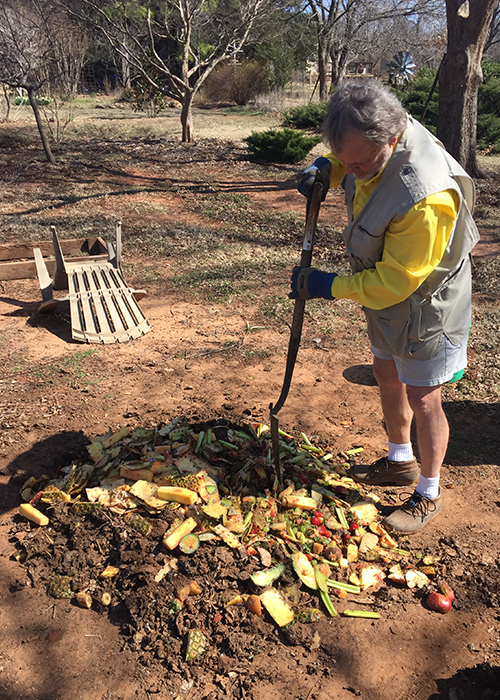
Food scraps anyone? OSU Dining Services looks to expand composting program
Tuesday, November 13, 2018
Oklahoma State University Dining Services is interested in increasing its composting program to both reduce food waste and help farmers. Composting turns organic matter like food scraps into a nutrient-rich soil conditioner. The process benefits crops, minimizes the release of greenhouse gases and reduces the amount of waste taken to landfills.
OSU Sustainability Coordinator Ilda Hershey started the University Dining Services’ composting program in 2013 by approaching vendors at the Stillwater Farmers Market. Initially, Tom Stevens, an OSU alumnus and former agronomy department staff member, collected scraps from the Student Union and Scott-Parker-Wentz kitchens, while Jeff Vitale, assistant professor in agricultural economics, collected from the Kerr-Drummond residence hall.
Today, Olen Thomas, a Stillwater resident and OSU alumnus, collects food scraps from Kerr-Drummond. He and his wife have been composting for the last 30 years, five of those with OSU.
“You can’t have too much compost,” Thomas said.
Thomas retrieves produce scraps from Kerr-Drummond three times per week in a 48-gallon wheeled cart, preventing an average of 438 pounds of waste each week from ending up in landfills.
“To have nutrient-rich compost, you need fresh material, which is what you get from the produce scraps, and you need dry material, like dry leaves,” Thomas said.
Thomas collects dry leaves from his own backyard. To begin the composting process, he first chops up the scraps, then mixes them with a slightly decomposed pile of compost.
“You need the bacteria and other organisms, which are present in the compost, to help break down the food scraps faster,” Thomas said.
After a few days, he aerates the compost pile by mixing it, which allows organisms to grow. Thomas also keeps the pile moist.
“Air and moisture allow bacteria to flourish,” Thomas said.
Thomas and his wife have six gardens and tend to their compost daily.
“You have to put in a little bit of work, but we like it,” Thomas said.
After the compost is complete, they lay a half-inch layer on the soil in their gardens to add nutrients and help lock in moisture.
In addition to diverting food waste from the landfill by giving it to local farmers, UDS supports Oklahoma farmers, ranchers and producers with local food purchases. More than 40 percent of the food and beverage that OSU purchases is locally sourced.
“We love to support our farmers around here, especially by buying from them,” said Reni Nguyen, Kerr-Drummond dining assistant manager. “Two or three cases of strawberries or cantaloupes easily sell within an hour or an hour and a half.”
OSU’s sustainable efforts in food composting would not be possible without the cooperation of local farmers. Material is currently offered for pickup at one campus kitchen location. UDS hopes to expand pickup locations as interest increases. Anyone who would like to collect food scraps and start their own composting program, or who would like more information can email sustainability@okstate.edu.
By Tara Sepulveda
PHOTOS: https://flic.kr/s/aHsmvQ6Edi
